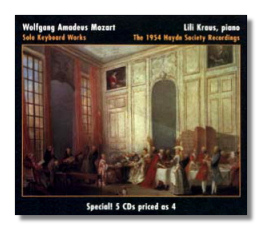
The Internet's Premier Classical Music Source
Related Links
- Mozart Reviews
- Latest Reviews
- More Reviews
-
By Composer
-
Collections
DVD & Blu-ray
Books
Concert Reviews
Articles/Interviews
Software
Audio
Search Amazon
Recommended Links
Site News
 CD Review
CD Review
Wolfgang Mozart

Solo Sonatas & Keyboard Works
The 1954 Haydn Society Reordings
- Sonata #1 in C Major "Durnitz", K. 279 (K. 181d)
- Sonata #2 in F Major "Durnitz", K. 280 (K. 189e)
- Sonata #3 in B Flat Major "Durnitz", K. 281 (K. 189f)
- Sonata #4 in E Flat Major "Durnitz", K. 282 (K. 189g)
- Sonata #5 in G Major "Durnitz", K. 283 (K. 189h)
- Sonata #6 in D Major "Durnitz", K. 284 (K. 205b)
- Sonata #7 in C Major, K. 309 (K. 284b)
- Sonata #8 in A minor, K. 310 (K. 300d)
- Sonata #9 in D Major, K. 311 (K. 284c)
- Sonata #10 in C Major, K. 330 (K. 300h)
- Sonata #11 in A Major "Alla Turca", K. 331 (K. 300i)
- Sonata #12 in F Major, K. 332 (K. 300k)
- Sonata #13 in B Flat Major, K. 333 (K. 315c)
- Sonata #14 in C minor, K. 457
- Sonata #15 in C Major, K. 545
- Sonata #16 in B Flat Major, K. 570
- Sonata #17 in D Major, K. 576
- Adagio, K. 540
- Allegro einer Sonata, K. 312
- Eine Kleine Gigue, K. 574
- Fantasy, K. 396
- Fantasy, K. 397
- Fantasy, K. 475
- Menuetto #6, K. 355
- Rondo, K. 511
- Variations on "La belle Françoise," K. 353
- Variations on "Salve tu, Domine," K. 398
- Variations on "Come un' agnello," K. 460
Lili Kraus, piano
Music & Arts CD-1001 AAD monaural 5CDs: 65:47, 78:16, 78:48, 71:36, 79:12
The first four discs in this set contain a substantially complete collection of Mozart's piano sonatas; only the composite Sonata in F (K. 533 and K. 494) is missing. The fifth CD contains a selection of variations and miscellaneous works, and of course this is only scratching the surface of Mozart's other works for solo piano. Even so, most of the good stuff is here, and if this is the only recording of Mozart's piano music in your collection, you're still in pretty good shape.
These performances originally were released on seven Haydn Society LPs, recorded in 1954. Kraus recorded much the same repertoire again in stereo for Epic/Columbia, and that set has been reissued by Sony much more cheaply than the one reviewed here. However, the consensus is that Kraus's Haydn Society versions are better than those on Epic/Columbia (which I have not yet heard), so it's wise not to let economy be your only guide.
Kraus had an interesting history. I've seen birth years of 1903, 1905, and 1908 cited for her, but there seems to be agreement that she died in 1986! Hungarian by birth, she studied with Bartók and Kodály before being taken on by Artur Schnabel. She quickly became known as a pedagogue and as an excellent chamber musician, and her name became closely linked with the music of Mozart and Schubert. In 1940, while on tour in Indonesia, she was arrested by the Japanese and spent the next two years in a labor camp. It wasn't until 1945 that she could pick up the threads of her career. Eventually, she came to the United States and taught at Texas Christian University.
No offense is intended if I describe Kraus's Mozart, at least in 1954, as "ladylike." She had no interest, it seems, in the highly interpreted, even explosive playing that has become more common today. Everything is in its place – clear, crisp, and perfectly balanced, with no self-indulgence or excessive emotionality. It isn't just the monaural sound that makes this playing sound old-fashioned. Even though Kraus became an American citizen, she remained a European at heart, and to hear her play Mozart is to be transported back to the Vienna Conservatory in the years between the two world wars. I wouldn't want to limit myself to Kraus's playing and interpretations, impeccable as they are. (In fact, I must admit that I take a perverse delight in playing Glenn Gould's Mozart recordings from time to time!) Still, any listener would be in good hands if Kraus were leading him through this repertoire.
These recordings have been transferred from the master tapes by Maggi Payne. Unfortunately, they show their age: there is light distortion and discoloration of the piano's tone in louder passages. There's not a lot of air around the piano either, and so one's ear can get fatigued by listening to this set for hours on end. Still, the sound is not bad, and shouldn't get in the way for most listeners. The 20-page booklet contains a long but very worthwhile essay by Bernard Jacobson about the repertoire. Music & Arts is selling this five-CD set for the price of four; all five discs are housed in a cardboard box well under an inch in thickness, so this set will not take up a lot of shelf space.
Copyright © 2007, Raymond Tuttle




















